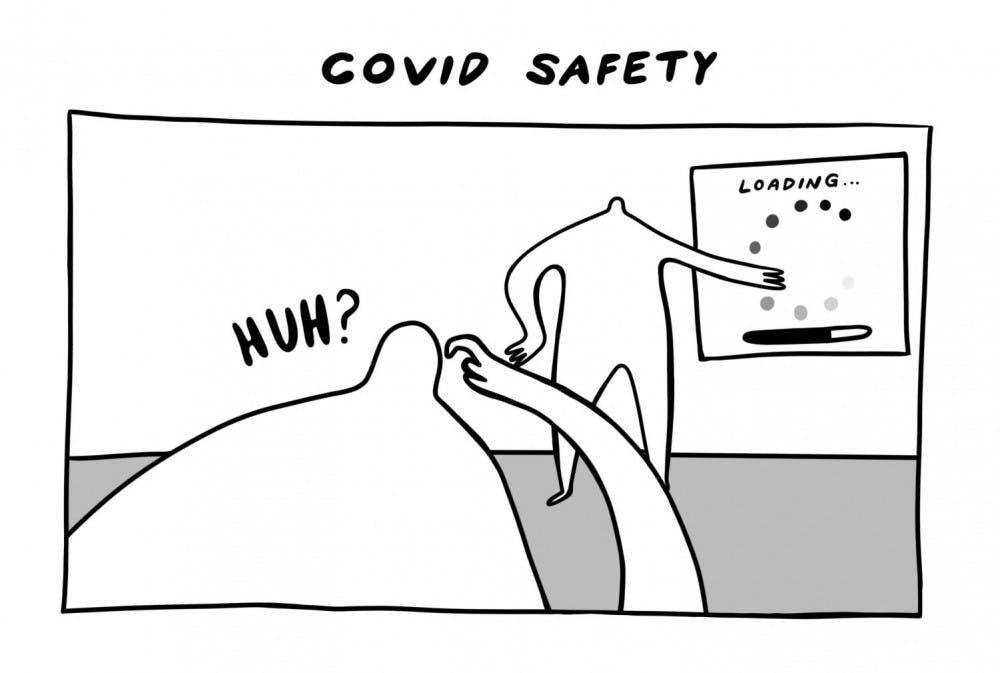Two weeks ago, we editorialized on the importance of testing as a means to mitigate community spread. Now, Middlebury is offering opt-in asymptomatic testing on Mondays. However, many questions and contradictions remain regarding Covid-19 risk and safety protocols on campus.
As a board, we are again asking for more transparent channels of communication and clearly stated guidelines. Our semester depends on it.
We, as students, feel as if we’re being kept in the dark. We’re being asked to navigate a situation in which we know that risk is present, but we don’t know where or how much. It doesn’t seem as if the administration wants us to know how prevalent Covid-19 is on campus, even if this awareness would lead us to make more risk-averse decisions.
Though the college does have some sense of the prevalence of Covid-19 on campus through sporadic testing, students aren’t being notified of cases on campus until days later. The Covid-19 reporting dashboard is only updated on Mondays, even though individual students are notified about their test results several days prior. This seems like an arbitrary, and ultimately unsafe, decision to withhold information about positive cases in our community — especially given that the current timeline for releasing information means students may go into the weekend without an accurate case count.
Even if we disregard how delays in updating the dashboard may make the case count outdated, the number of active cases right now — idling around four — is only representative of the cases found in the distinct fraction of the student body who have been tested, meaning that many cases may go unidentified in students that aren’t being tested.
An email sent out by the SGA quoting CDC guidelines notes that testing is recommended for high-exposure activities such as “attending large social or mass gatherings, or spending time in crowded or poorly-ventilated indoor settings.”
Spoiler alert: if you’ve eaten lunch in a dining hall, this includes you.
And we are not only unsure of the number of cases on campus — we also don’t know what the college’s plans to do if there is an outbreak.
In addition, this week was the first time many of us had heard of contact tracing efforts being undertaken this semester, and it remains unclear to what constitutes an exposure, or what students are expected to do if notified. Should they still go to the dining halls? Attend in-person classes?
Some official contact tracing alerts also seemed to occur days after students were already aware of a proximate case, leading them to seek testing in town far before they were required to do so on campus. One of our editors noted that she was contact-traced via one of her classes, but her professor was not notified.
Though CDC guidelines state that vaccinated individuals do not have to isolate, we also must acknowledge that those guidelines are not necessarily targeted toward a residential campus. (And if any CDC official were to step foot in Atwater on a Saturday night, they would likely rethink their regulations.)
In essence, we want to be safe. But again, we’re not sure how to do that — what constitutes concern is still incredibly unclear. We’re told to cautiously travel off campus though we know hoards of parents from all over — whose vaccine status is currently assessed based on the honor system — will arrive on campus next weekend. And as fall break looms, students are unsure if they should just stay put over the four-day weekend to limit potential exposure; however, without transparency regarding Covid-19 testing, students don’t even know how safe it is to be on campus at the moment.
We’re unsure if we’re supposed to skip class and quarantine if we have a dull headache or the sniffles, and if we do decide to isolate, there’s no guarantee that professors will accommodate our absences.
The cases identified on campus thus far demonstrate that vaccines cannot be our only safeguard. Keeping each other safe means knowing what safety levels actually look like on campus day to day. Middlebury students are ready to hold up our end of the bargain — but we can only do so if we know the costs.
Keeping us in the loop is the minimum requirement

Comments


